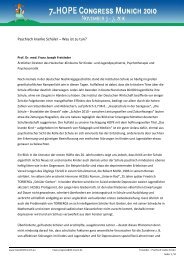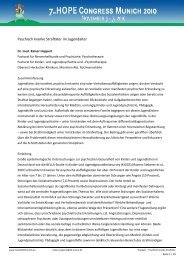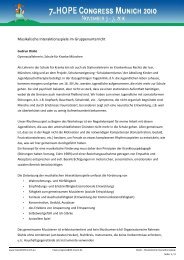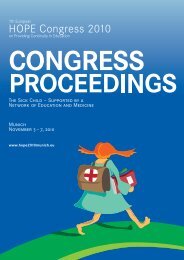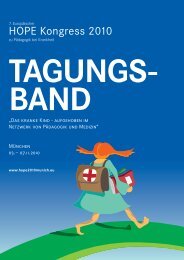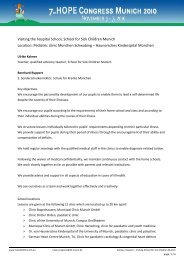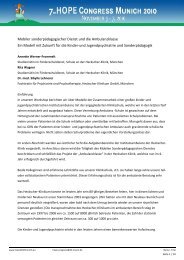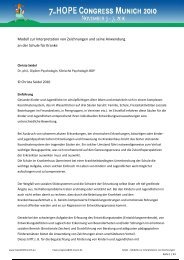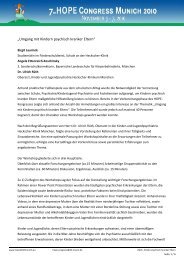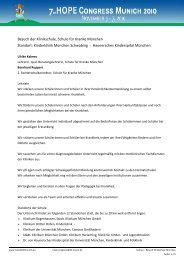HOPE Kongress 2010 - Hope Congress Munich 2010
HOPE Kongress 2010 - Hope Congress Munich 2010
HOPE Kongress 2010 - Hope Congress Munich 2010
Sie wollen auch ein ePaper? Erhöhen Sie die Reichweite Ihrer Titel.
YUMPU macht aus Druck-PDFs automatisch weboptimierte ePaper, die Google liebt.
7th European <strong>HOPE</strong> <strong>Congress</strong> <strong>2010</strong><br />
• The letter was also sent to;<br />
• the SENCO,<br />
• the Educational Psychologist for the school<br />
• the senior Educational Psychologist for the Local Authority<br />
• Head Teacher of the hospital school<br />
• James and his parents<br />
• the Chief Executive for the school’s Local Authority.<br />
The Outcome<br />
• A third meeting called by the school in June <strong>2010</strong>.<br />
• SENCO, mother, James, the educational Psychologist, myself and the<br />
head teacher for the school.<br />
• Updates given on James’s wellbeing.<br />
• Academic results indicate that James is not achieving in line with his ability.<br />
• School agree to progress with assessing James for a statement.<br />
Aftermath<br />
• All necessary assessment and documentation collated for a special<br />
needs panel review within 2 weeks.<br />
• James was granted a statement which means;<br />
• his educational needs are protected until he is 19 yrs old<br />
• they are reviewed yearly.<br />
• He now has a tutor assigned to him all the time who works with him<br />
between school, home, and hospital.<br />
• The SENCO has retired and her replacement has forged a real relationship<br />
with James.<br />
James<br />
• Does legislation in your country protect the needs of children with a<br />
medical and mental health condition?<br />
• Can you suggest other ways in which this could have been dealt with<br />
differently that might have made for a quicker and smoother resolution?<br />
• How can we support schools in understanding that many chronic<br />
conditions can impact on individuals in very different ways?<br />
• How might you have dealt with this?<br />
Part 2<br />
Managing complex medical cases and education: Transition<br />
Maria Marinho<br />
Assistant Head Teacher, Chelsea Community Hospital School<br />
Background<br />
• 14 year old girl<br />
• Living with father & brother<br />
• Referred to the hospital school for home tuition having moved into the<br />
local area<br />
• Had not attended school for 10 months prior to referral<br />
• Psychiatric team heavily involved.<br />
Previous History<br />
• Previous psychotic episode at age 12 possibly linked to anti-malarial<br />
medication<br />
• Hospitalised for 6 months<br />
• Successfully transferred to small tuition unit for rehabilitation and<br />
successfully returned to mainstream school<br />
• Lenesha and her brother lived with their mother but visited their father<br />
who lived separately.<br />
Referral Information<br />
• February 2009 mother died<br />
• Lenesha and her brother moved to live with their father in a different<br />
part of the city.<br />
• Lenesha presented with a range of psychiatric symptoms requiring<br />
intensive intervention however she was not admitted to hospital.<br />
• She refused to engage with some members of the psychiatric team<br />
First Meeting Between Hospital School and Lenesha<br />
• She had not left the house for several months<br />
• She remained all day in her night clothes<br />
• She did not make eye contact<br />
• She spoke in a very quiet voice only to answer direct questions<br />
III. Workshops und Foren<br />
• The room was dim and chaotic<br />
• She said she was interested in learning and liked English and ICT<br />
95<br />
Planning Input<br />
• Needed an experienced staff member who could develop a trusting<br />
relationship<br />
• Needed to build a trusting relationship with her father<br />
• Needed to work very closely with the psychiatric team<br />
Plan<br />
• Request made to education authority for 10 hours teaching input per<br />
week.<br />
• Refused and only 5 hours input was authorised<br />
• Initially one female staff member to visit 3 times per week.<br />
• Focus on subjects of interest and core skills, English, maths science<br />
and ICT<br />
• Laptop with internet access provided with facility to message teacher<br />
outside of allocated slots<br />
Issues to consider<br />
• Lenesha did not know what caused her mothers death<br />
• Father was very concerned about her vulnerability and her ability to<br />
return to her previous sociable self.<br />
• Very little progress with psychiatric input<br />
• Lenesha was concerned that her tuition was linked to a hospital school<br />
as she was highly anxious that she would be admitted to hospital again<br />
as she had been when she was 12<br />
Actions taken by tuition team<br />
• Focus of input was to develop a positive and trusting relationship that<br />
would support Lenesha to move out of the house for short periods of<br />
time<br />
• Activities organised that gave Lenesha some control<br />
• Focus on bringing the outside world to her through the laptop, giving<br />
access to her teacher and a view of the hospital school classroom<br />
• Frequent reference made to next steps outside the house<br />
Difficulties<br />
• Level of grief and anxiety extremely high<br />
• Too much for one staff member<br />
• Father feeling powerless<br />
• Lisa’s refusal to engage with the psychiatric team<br />
• Additional pressure placed on teacher to focus on aspects of the<br />
psychiatric teams work because the teacher had developed a positive<br />
relationship with Lenesha<br />
Positive Aspects<br />
• Lenesha appeared to value input from the hospital school<br />
• She liked her teacher<br />
• Good communication between the range of professionals involved in<br />
the case<br />
• Father supportive of input<br />
Turning Point<br />
• Father re-established links with maternal aunt following advice from<br />
psychiatric team<br />
• Lenesha began using messenger frequently with her teacher and was<br />
curious to see the classroom in the hospital via video link<br />
• Aunt persuaded Lenesha to go shopping one weekend<br />
• Aunt agreed to accompany Lenesha to the Hospital School for a short<br />
visit<br />
New Start<br />
• Lenesha agreed to attend hospital school for afternoon sessions<br />
• This quickly became full days<br />
• Lenesha worked 1-1 with a teacher in the classroom<br />
• She needed a lot of support to access learning tasks<br />
• Initially she did not engage with any other students<br />
What next?<br />
• It was clear Lenesha had some underlying learning difficulties as well as



